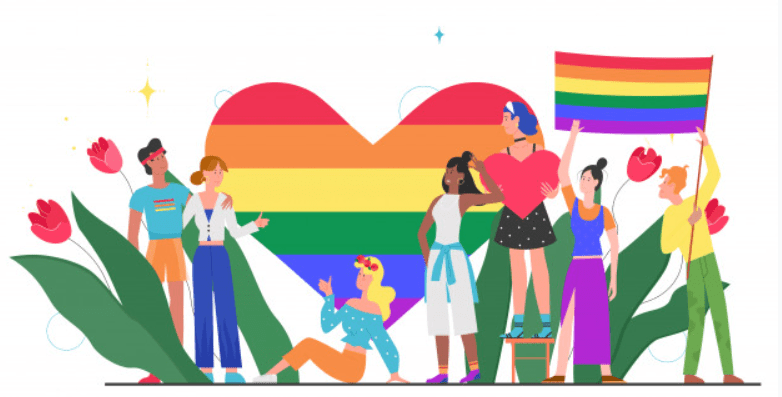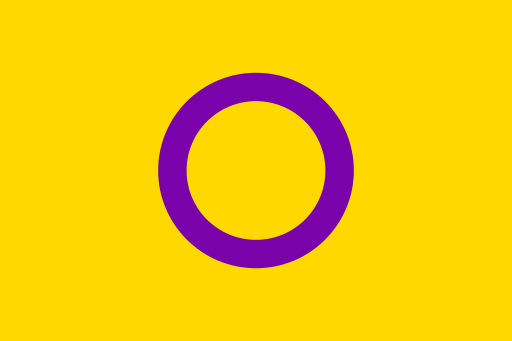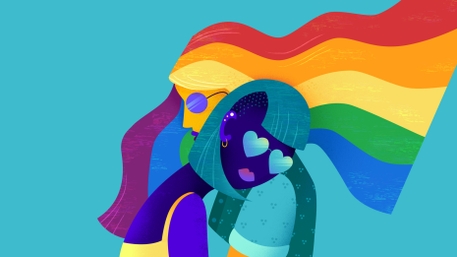We asked some LGBTQIA+ students from across the IISERs to join in on a conversation about their experiences, both on and off campus. Pizza(he/him), Ariana Venti (he/him), Shubham (he/him), VIshnu (he/him) and Buttercup (she/her) sat down for a virtual informal session where they swapped stories, advice, thoughts and more.
Pizza [P]: So I wanted to ask, if it isn’t very intrusive, do your home institutes have LGBT+ clubs or something like that?
Shubham [S]: At IISER Kolkata, we just got permission from the administration to form an LGBT+ club on campus. It took us almost half a year to get it going.
Ariana Venti [AV] : AT IISER Mohali, we don’t. I was wondering if we could. Our magazine is Manthan and we are doing a collaboration with Ether for Pride month so this year we are releasing a lot of Pride-themed articles. That’s pretty much the only thing we are doing right now, but it would be nice to have one. You guys at IISER TVM have one right?
[B]: It’s an instagram page at this point, that’s it.
[P]: Homines is our unofficial club. It is just a safe space where everyone can say whatever they want. I don’t think it will become an official club for several reasons—the main one being anonymity. Many people who reach out to us are in the closet. Right now the club can collaborate with anyone they want without having to deal with bureaucracy . LGBTQ issues are political in nature and I don’t know how welcoming everyone would be of them.
[AV]: Here at IISER Mohali we have an unofficial group called Confluence. It’s kind of like the protest group on campus. There were protests against the Citizenship Amendment Act (CAA), protests against the treatment of workers, and they were involved in all of that.
[P]: I still remember that feeling when I entered the campus during my first year. At home, very rarely would I meet someone else who was like me. In this new land, where I didn’t know anyone, how would I know if someone was queer of not? Then one day, all of a sudden, my gaydar (a colloquial term used to refer to the intuitive ability of some LGBTQ+ people to identify other LGBTQ+ people) started tingling. It isn’t something you can say out loud, or go upto someone and ask them if they are gay. They may be, they may not be. Then after the Homines club page was published, my god! It was true! That person came out to me. And the feeling of knowing that I wasn’t alone was amazing.
[B]: It feels like Schrödinger’s gay—that person is both gay and not gay and you won’t know until they tell you.
[P]: The first two years of college were hell. I was trying to understand who I was. Before that, during high school, I had just put those feelings in a box, told myself to not open it because it would bring all these messy things. When I finally entered college I thought it was time I opened that box, and then all these issues just poured out. The thing is, there was no one around me who I could relate to. I came out to my friends and they were all very supportive, but they could not understand what I was going through. They would say, “We are there for you.” But it’s a different feeling when someone knows exactly what you are going through and can give you real advice. I was so happy when the Homines page was published and people could relate to it.
[AV]: All of the LGBT people I know on campus are people I personally know because most people are only out to their friends or other people they know but don’t tell everyone. I’m pretty sure there are more people, I just don’t know them.
[B]: The fun thing for me was that when I told someone, “Hey I’m gay”, they said to me, “I think I’m bi.” Like I came out to them, and they came out right back to me.
[P]: When you are talking to some people, you get that feeling that might be, but then you think aise thodi assume kar sakte hain (we can’t just assume things like that).
[AV]: Yeah! Like I am being stereotypical here by assuming?
[P]: How can I be better than the people who just make assumptions about our gender or sexual orientation? My roommate was amazing when I came out to him. The day the judgement about section 377 came out, I was watching the news on my laptop in my hostel room and he asked me why I was watching that. The moment the verdict was announced, I started jumping with joy. And so without saying anything, he just realized.
[AV]: That’s nice. With me, I actually had to come out twice because when I was in school I realized I was gay, or at least I thought so at the time, and I told some school friends that. When I came to college, I told my college friends that as well. A few months into my first year of college I realized I was bisexual. So I had to tell people that, “Oh by the way, I was half wrong about that.”
[B]: I had the reverse journey. Initially I thought I was straight. Then the feelings for other women that I had been pushing away for years started creeping up and I thought I was just a tiny bit bisexual. Upon further introspection, and learning about the concept of compulsory hetreosexuality, I came to the realization that I was a plain old lesbian. I often get questions about boys and boyfriends and I think apko kaise batayein (how do I tell you)?
[AV]: Yeah! My family used to ask me about when I was going to get married, but what if I don’t want to, or can’t?
[P]: Sometimes when I look at old pictures, I think, how didn’t you know I was gay?! It was right there! Until about 5th grade, my mother and I used to paint each other’s nails. That was the best time I would have with her. Right now, things are good at home. I am lucky that my mom and my family accept me. When she initially found out, she asked me if that was why I was so disconnected from my family. When you come out, two things can happen—either they will accept you or they won’t. And if they won’t accept you, disconnecting and distancing yourself beforehand kind of helps to lessen that hurt. She asked me, “You must have been so alone all these years.” and at that instant, I started crying because it was such a true statement. My dad still finds it difficult to talk about it but he is chill. He tries to learn. I was also lucky enough to have my brother by side during all of this.
[B]: Wholesome story.
[P]: I think it was last year itself, around this time, that I had come out to my family.
[AV]: About coming out to my parents, I’ve thought about how I wanted it to go. I’ve come close but never quite told them.
[P]: The most common advice I have heard is to come out to your family once you are financially independent so that even if they cut you off, you will still have a roof over your head. All our lives we hide, because our identities aren’t the norm. From that point on, we are alone in some sense because your friends and family aren’t like you. You don’t live the way you want to.
[AV]; It’s hard enough to say it to your friends, and so telling your parents feels unimaginable at first. Later on when you’ve told many friends, you become more comfortable and gain confidence.
[B]: A while ago my sister called me up and asked me if it was okay to use the word ‘gay’ as an insult, and I explained to her why it wasn’t and she said to me, “I thought so too, so I told my friend to stop saying that.” I’m not out to her, but that small comment made me feel so good, knowing that she will probably accept me when I tell her.
[AV]: Back when I was in school, guys would often use the word ‘gay’ as an insult.
[P]: When I play video games, people from the opponent’s team will sometimes calling me gay and I say to them, “I am gay!” In school I used to see a lot of toxic masculinity, but not so much among my college friends. I often joke about putting nail polish on them, and they play along and don’t mind it. I don’t stay in touch with people from school anymore. I closed that chapter of my life and never looked back for a very particular reason.
[B]: In the neighbourhood I grew up in, there was this one boy, who was a little effeminate, who was teased relentlessly by the other kids. They called him gay, though he never said he was. They wouldn’t invite him, or play with him. The message all of that left for me was that if you were not straight, no one will befriend you, and you will be alone. It was a terrifying thought for a 12 year old. It made me shove all of my same-sex attraction deep down and I refused to acknowledge it for the next 8 years.
[AV]: When I first realised I was attracted to other guys, I didn’t know anyone else who was openly gay at the time. I didn’t really understand it much, or have a lot of knowledge about the LGBT community but I decided that it would be a bad idea to tell anyone, because again of that whole being-teased-for-being-feminine.
[P]: I used to look into the mirror and ask myself, “Am I gay?” and I would instantly follow it up with the thought, “No! You’re not supposed to think about those things. You don’t really want the answer to that question.” All of that peer pressure in school where you were forced to pretend to like a girl or have a girlfriend, it was horrible.
[B]: The first distinct memory I have of being attracted to another girl was my friend’s older sister. I was maybe 11 years old when I first met her, but I couldn’t understand my feelings for her because no one had told me it was possible for a girl to like another girl. I kept mislabelling the feelings—sometimes as close friendship, as jealousy, as platonic admiration. Eventually when I realised I was a lesbian, everything clicked. All those childhood experiences suddenly made sense.
[P]: Growing up I used to watch this cartoon Digimon. In the show, the small digimon would turn into a big dinosaur-kind of creature. I felt the same way when I realised I was gay—the feeling of euphoria and suddenly just growing up to your highest form. It felt so good! Bachpan se itna chhup, chhup kar jiye hain (since childhood we have lived our lives in hiding) and I don’t want to pretend anymore.
[B]: Last year in June when we were only a few months into the pandemic, I told myself that I would definitely go to Pride in 2021. I think I jinxed it!
[P]: Same. I haven’t attended my first pride yet.
[AV]: I have wanted to go since tenth grade, but I wasn’t confident enough back then, and then after that there was always something or the other in the way.
[B]: I’ve thought about joining dating apps to find other queer women, but I’m afraid someone might find me and out me. I don’t want my parents to find out from someone else. I want to be the one to tell them. That’s why I am very selective with the people I tell.
Vishnu [V]: I’m glad you guys were able to figure out what you identify as, but for me it has been different. Growing up I had crushes on a lot of male cartoon and movie characters, but didn’t understand what it all meant. I tried going by bisexual, and pansexual, but it didn’t quite fit well. I don’t exactly know what I am, but I don’t think a label should define me.
[P]: Our community fights against being labelled—it’s what we are about. It’s a spectrum and you can lie anywhere on it.
[B]: Unrelated to our current topic, but I have this strange fear. What if the girls in my hostel find out I am gay and then they begin to feel uncomfortable around me, or sharing our common bathroom, or feel as if I am hitting on them. I don’t know if it is a realistic fear or if I am over-reacting. None of the friends I have told have ever expressed any discomfort like I described and they treat me the same as before, but I still can’t shake the feeling that my presence might make some other girls uncomfortable.
[P]; In that sense I consider myself lucky because the floor of the hostel building I live on is filled with my friends so I haven’t faced anything like you described. But I have thought about how people would react when I would come out to them. I haven’t really faced any overt homophobia yet. The only thing I have experienced that comes close was an incident in the hostel mess once.
[B]: That is good to hear.
[AV]: About homophobia, I feel like IISERs are generally open-minded places and the majority of people are not explicitly homophobic but in such big communities you will have all kinds of people and some of them will not be very accepting. On one or two occasions I have heard people make remarks about me being feminine, but no one has said anything to my face.
[P]: Sometimes my friends will comment on how masculine or feminine a person is, and I get really angry. Let people be! What’s the problem in being feminine or masculine anyway? Back then I didn’t really have the knowledge on how to counter homophobic and queerphobic arguments, and I was also not comfortable with myself. I hated myself. I hated myself for liking other guys. During the second year of college, I started having feelings for one of my friends. I cried myself to sleep everyday for almost a month because I couldn’t come to terms with the thought of liking another man. That was the most intense hate I have ever experienced, and it came from myself. I eventually told the person that I liked him, and he turned me down gently. He was very understanding. From that moment on I started trying to understand who I was.
[B]: Looking back, everything makes sense now—all the feelings, thoughts and behaviours I had as a child. It all just clicked when I embraced myself.
[P]:Everything starts making sense. And going through that phase of self-exploration and self-acceptance also makes you a better person. You become more empathetic, and in understanding yourself, you also start understanding other people too. No one was there for you when you were going through a hard time, so you develop compassion for other people in your community and give them the support you wished you had when you were younger.
[B]: I think of it as, “I want to be the person I wish I had growing up.”
[P]: Think of the years that we lose. I still remember that out of fear of what my friends might say, I stopped wearing nail polish. I stopped spending that quality time with my mom where we would paint each other’s nails. I would lock myself in a room and secretly put nail polish on my toes because no one would know that way. When you are wearing shoes, koi dekh nahi sakta (no one can see). I regret that I didn’t have some sort of a role model growing up. I feel a little angry and frustrated.
[B]: I don’t know a single wlw (woman-loving-woman) couple in real life. I have no kind of reference for a healthy, long-standing sapphic relationship. All of the couples that I know who have good relationships are straight people, and their relationship dynamics are completely different from queer ones. I think about how different my life would have been if I knew queer adults growing up. And then I think about how I can make the lives of other queer young people better by being that queer adult I wished I had. That is one of the biggest motivators for me to come out publicly, especially on campus because it can have that domino effect of making other queer people feel safe enough to come out.



